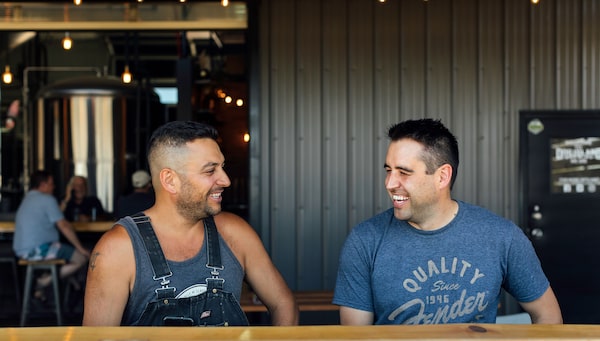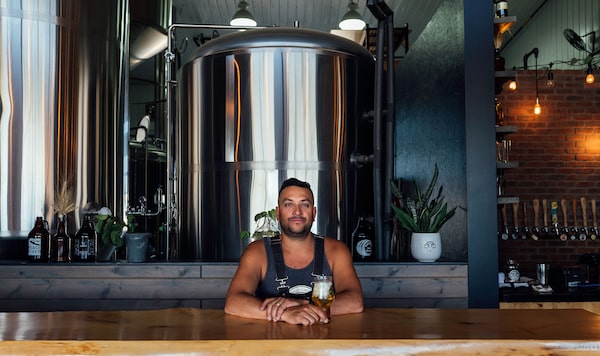
From left, co-owners of Dog Island Brewing, Ben Fiddler and Chad Paulson. They decided to open a brewery in Slave Lake when the town was recovering from a wildfire to give people a place to gather and have fun.Dog Island Brewing/Supplied
Indigenous-owned breweries in Canada are rare, in part due to discriminatory laws that in the past took away rights, traditions and autonomy.
When the Indian Act was introduced in 1876, one of the areas it sought to control was the consumption of alcohol. It imposed strict regulations, prohibiting the sale of alcohol to Indigenous peoples and punishing anyone who violated the Act, both on and off reserves. Some sections involving liquor were not repealed until more than 100 years later.
This not only restricted cultural practices, it contributed to the perpetuation of negative stereotypes about Indigenous peoples. The Act’s provisions implied they were incapable of responsible alcohol consumption and needed external authorities to govern this aspect of their lives.
Indigenous-owned breweries make up a small percentage of the industry in Canada. This is attributable, in part, to the regulatory constraints that were outlined in the Indian Act, but it also serves as a manifestation of the differing opinions within communities. There are more than 3,000 reserves in Canada for more than 600 First Nations. Many of them do not permit breweries to operate on their reserves.
“There’s a history of attachment of alcohol to a lot of the traumas in our society,” says Michael Doxtater, who is recognized as a leader and innovator in Indigenous studies, and currently teaches at Toronto Metropolitan University. He is from the Six Nations of the Grand River territory.
Mr. Doxtater points out that some reserves follow the Red Road, a life journey that many Indigenous groups recognize, which addresses addictions and mental-health recovery using medicine-wheel lessons.
“Generally speaking, there is a movement in a lot of these communities about abolition [of alcohol],” says Mr. Doxtater from the Six Nations of the Grand River territory, where they tried to introduce a brewery in the early 2000s, but most people voted against it.
Each community is different.
The entrepreneurs behind the few Indigenous-owned breweries across Canada are challenging the stereotypes that emerged from the Indian Act. They’re building reputations as talented brewmasters, while rewriting existing narratives about the relationship between Indigenous peoples and alcohol.
Dog Island Brewing, in the northern Alberta town of Slave Lake, was opened in late 2016, by Ben Fiddler and Chad Paulson, both Métis. Since then, the brewery has become a popular place among locals and tourists.
“There’s about 7,000 people (in town) in the wintertime and 10,000 in the summer,” Mr. Fiddler says. “We basically know everybody.”
Mr. Fiddler learned how to brew beer in Edmonton while working toward certifications as an instrumentation technician and electrician. He often studied at a quiet microbrewery, where he became friends with the head brewer. Over time, they worked out a deal where Mr. Fiddler maintained and repaired equipment in exchange for lessons on the art of brewing beer.
Years later, Mr. Fiddler returned to his home town, where he met Mr. Paulson, who was also an instrument technician. They joined forces as business partners. At the time, Slave Lake was slowly recovering from a devastating wildfire that destroyed about a third of the town, including hundreds of homes and businesses.
It had been five years since the disaster, but Mr. Fiddler says no one had rebuilt a place for people to gather and socialize. He and Mr. Paulson saw an opportunity. “We decided to take the leap and open a real small, kind of niche brewery, and it kind of just expanded from there,” Mr. Fiddler says.
Kahnawake Brewing Co. also got its start in 2016. Its mission was to change the beer landscape in Kahnawá:ke, one of several communities that make up the Mohawk Nation. Co-owners Matt Deer and Fred Leblanc, who are Indigenous, and Drew Stevens worked for about a year and half with the band council to create regulations for beer production in the community, located 10 kilometres south of Montreal.
The idea was to have a brewery for everyone, no matter their background. Kahnawake Brewing Co. served its first pint on St. Patrick’s Day in 2018, and it bills itself as the first Indigenous-owned microbrewery on a First Nations’ territory in Canada.
The business initially operated as a brew pub with a restaurant, producing beer on site. When the pandemic hit, it pushed Kahnawake Brewing Co. to pursue pre-existing plans for canning and distribution. Now it distributes to other First Nations in Quebec.

Co-owner of Dog Island Brewing, Ben Fiddler.Dog Island Brewing/Supplied
Aside from a few negative comments on social media, Mr. Stevens says reception to the brewery has been positive, and that the community recognized the potential for craft beer to attract tourists. This was successful, with many people coming to visit from Montreal. “Beer brings people together, and we’ve really succeeded in doing that with our location here,” he says.
The business has intentionally avoided stereotypical Indigenous imagery in its branding. Instead, it tapped into the community’s deep connection to ironworking. Many Mohawk men — including Mr. Leblanc — worked in the trade.
At Dog Island Brewing, the company’s name pays tribute to local history. The town of Slave Lake is located on the southeastern tip of the massive Lesser Slave Lake. Its only island is called Dog Island, as it was believed to be used at one time as a summer home for RCMP sled dogs.
While Mr. Fiddler is familiar with the hurtful stereotypes about Indigenous peoples and alcohol stemming from the Indian Act, he says his experience as an Indigenous brewery owner has been overwhelmingly positive — a fact he credits to doing business in a small town.
In his view, people’s thoughts about the brewery don’t connect him and Mr. Paulson to their Indigenous backgrounds. “It’s the product that they care about.”
One in a regular series of stories. To read more, visit our Indigenous Enterprises section. If you have suggestions for future stories, reach out to IE@globeandmail.com